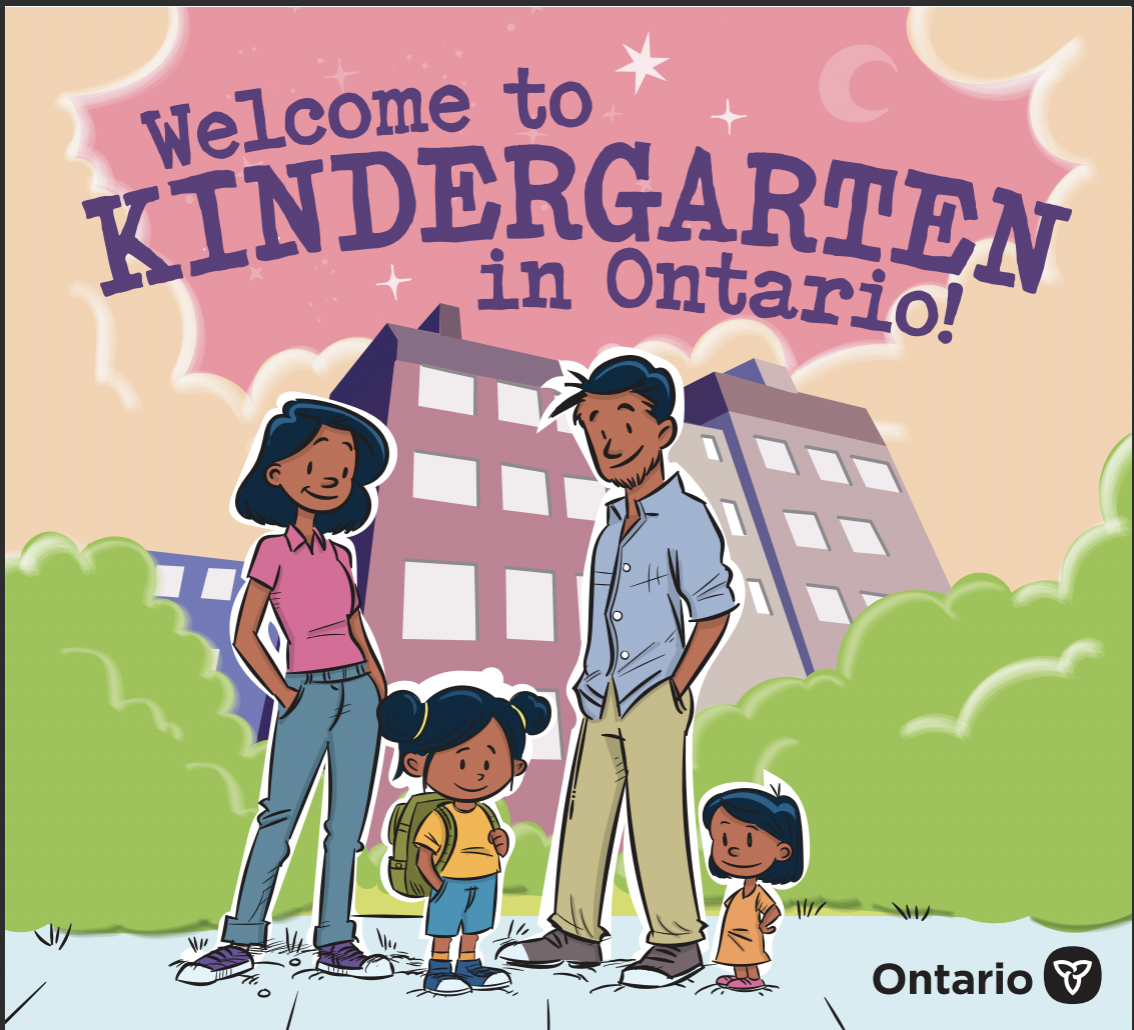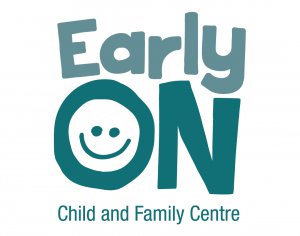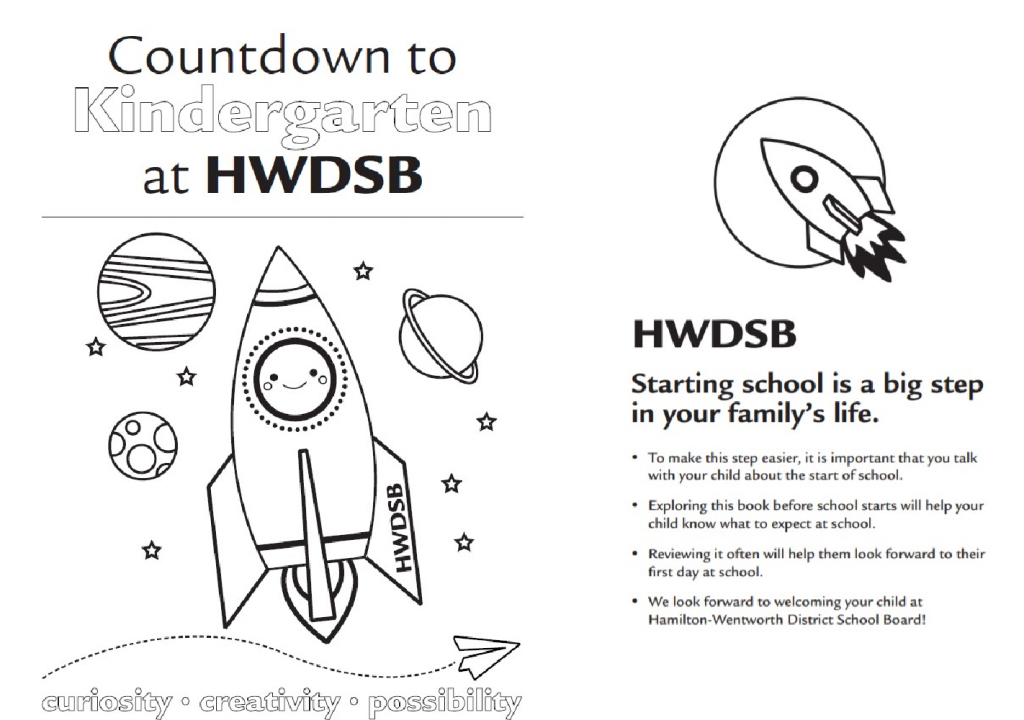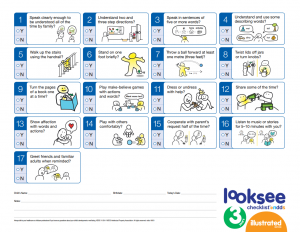
Click here for more information about Kindergarten at HWDSB.
Your child’s first day at school is around the corner!
HWDSB schools typically welcome families to Kindergarten Orientation events in May of each year. This is a great chance for families to visit the school with their child(ren) to learn more about Kindergarten.
Contact your local HWDSB school in the spring to find your date.
Kindergarten at HWDSB
A video tour of what happens during a typical kindergarten day at a school in HWDSB.
Welcome to Kindergarten Orientation
A narrated video based on the presentation we provide to elementary schools for their Kindergarten orientation events.
Special Education
Children enter Kindergarten with various needs and abilities. Click here to learn more about Entry to School for children entering Kindergarten who may require Special Education services.
Social Story Book
A booklet about Kindergarten that families can print and explore with their child.
- Kindergarten Activity Book – English
- Translations: Arabic; Chinese; Kurdish; Punjabi; Serbian; Somali; Spanish; Urdu; Vietnamese

There are two heartwarming Welcome to Kindergarten stories (Amir and Amira versions) that gently walk children through what to expect at school – making friends, meeting educators and exploring their classroom.
There is also an Interactive Activity Book in pdf for printing. The book is a playful, parent-child resource filled with colouring, drawing and reflection activities that encourage children to talk about their feelings, routines and hopes for Kindergarten.
Resources for Future Kindergarten Families
What will my child learn?
Click here to read our Countdown to Kindergarten Handbook.
During the two-year Kindergarten program, your child will have an opportunity to learn:
BELONGING & CONTRIBUTING
|
|
SELF-REGULATION & WELL-BEING
|
|
DEMONSTRATING LITERACY & MATHEMATICS BEHAVIOURS
|
|
PROBLEM SOLVING & INNOVATING
|
|
How can I help my child prepare for Kindergarten?
The importance of families
You are are an important part of your child’s education!
Young children come to school capable, curious and rich in experiences. Important stages of learning and development occur between birth and six years of age in all areas of growth — communication, emotional, intellectual, physical and social.
Children learn at different rates and in different ways. Our team of educators recognizes the unique strengths, interests and needs of children entering our program and adjust teaching methods and materials to support their growth.
How to help your child prepare for Kindergarten:
- Be responsive and positive – listen to your child
- Talk, read and sing to your child daily
- Encourage clear speech
- Encourage safe exploration and play
- Be selective in the TV shows you watch together
- Encourage independent toileting and dressing
- Promote sharing and co-operation
- Expose your child to painting, crayons and scissors
- Introduce your child to letters and numbers
- Visit your local library and family resource programs such as Early ON programs
- Complete the Looksee Checklist (see section below, Is my child ready for Kindergarten?) and review with a health and/or child care professional.
- Kindergarten Ready: Tips for parents/caregivers to ease the drop-off
Remember, families help HWDSB schools learn about each child’s unique strengths, needs and interests.
Is my child ready for Kindergarten?
The LookSee Checklist
The Looksee Checklist is a simple, easy-to-use developmental tool designed to help monitor a child’s development from 1 month to 6 years of age, featuring a short list of “yes” or “no” questions about the child’s abilities. With the vision of helping all children reach their developmental potential, the Looksee Checklist (formerly the ndds checklist) was created in 1993 by ndds, a Canadian non-profit organization made up of early childhood specialists. In the 25 years since, it has been translated into over 10 languages and has helped thousands of children worldwide through initiatives with organizations like the Ontario Ministry of Children, Community and Social Services and World Vision.
Is my child language-ready for school?
Many parents considering Kindergarten wonder if their child is ready for school. In addition to the Looksee Checklist, HWDSB staff offer the following guidelines for early language.
By age four, your child should:
- Follow simple directions with two or three steps (e.g. Get your boots and hat and meet me at the front door)
- Pronounce words like children their age
- Be understood by people they don’t know most of the time
- Speak in sentences that sound about the same as an adult’s
- Use endings on words like dogs, jumped, or biking
- Play a pretend game and describe it to you in enough detail for you to understand
- Ask questions about a book you just read together, like “Who was your favourite character?”
- If your child is unable to do the things listed above, a speech-language pathologist should meet with your child.
This can be arranged in Hamilton through Early Words, a publicly funded organization that provides speech and language services to pre-school children. You can also visit an Ontario EarlyON program and/or access the LookSee Checklist. The LookSee Checklist makes the following recommendation for follow up, “If you answer “no” to any question or have any concerns about your child’s development, follow-up with a health care and/or child care professional.”
Call (905) 381-2828 to register your child before June 15 so your child is eligible for Early Words services in Kindergarten. There is no cost to families. Find more information.
How can I learn with my child?
 EarlyON Child and Family Centres provide free opportunities for children from birth to six years of age to participate in play and inquiry-based programs, and support parents and caregivers in their roles. These centres offer safe and welcoming environments open to all families across Ontario, with qualified professionals and quality programs. Families and caregivers can find support, advice, make personal connections and access a network of resources. Click here to find a location near you or call 905.524.4884 for more information.
EarlyON Child and Family Centres provide free opportunities for children from birth to six years of age to participate in play and inquiry-based programs, and support parents and caregivers in their roles. These centres offer safe and welcoming environments open to all families across Ontario, with qualified professionals and quality programs. Families and caregivers can find support, advice, make personal connections and access a network of resources. Click here to find a location near you or call 905.524.4884 for more information.
- EarlyON
- Contact Hamilton – Contact Hamilton is an entry point to services for children and youth with emotional, behavioural or developmental concerns and adults with developmental disabilities.
- Hamilton Public Library
What are my child care options?
The Hamilton Child Care Registry is an online registry that makes it easy to find and apply for licensed child care in Hamilton. If you require financial help, you can apply for a fee subsidy with your Hamilton Child Care Registry account.
For details on child care at HWDSB schools, please visit our Child Care web page.
Hamilton Public Health Services
Hamilton Public Health Services offers a range services and supports to address the growing and changing needs of our community. Nurses, doctors, counsellors, and other trained health professionals work with our community partners to promote and protect your health, prevent infectious diseases, and inspect for health hazards.
Reporting Vaccinations: Parents are responsible for submitting their school-age child’s immunization/vaccine record to Hamilton Public Health. Visit the City of Hamilton website for more information on how to submit the immunization record and/or Hamilton Public Health protocols regarding vaccine exemptions.
Parenting Supports: As a parent, you are the most important person in your child’s life. It is normal for all parents to have questions about parenting.
Parenting School-Aged Children: Information to help you guide your children and teens through this exciting and interesting period of growth and development.
More Resources:
Transportation and the First Rider program

Hamilton-Wentworth Student Transportation Services (HWSTS) provides transportation for eligible HWDSB Kindergarten students if the walking distance to their home school exceeds 1.2 kms. HWSTS mails a letter to eligible students in mid-August detailing the online parent information portal and busing.
We take student safety seriously and believe that our youngest riders deserve support as they start to ride a school bus. Each summer, HWSTS offers First Rider orientation and safety training sessions for Kindergarten students and guardians. In sessions about 45 minutes long, students and their parents watch a bus safety video, ride on a school bus, and receive an introduction to all the safety features on the bus. Students will receive an information package and a certificate with their name on it.
Details are posted online each June about the First Rider programs, locations, dates, and eligibility.
Additional Questions and Answers
Can my child attend Kindergarten part-time?
Kindergarten is not mandatory, and parents can choose to have their child attend Kindergarten on a part-time basis. Schools will explain how part-time attendance would be structured (e.g. half-time mornings/afternoons etc.) Your child can begin full-time attendance when you feel they are ready.
Does my child need to have learned to use the toilet?
All children have a right to attend Kindergarten in the calendar year they turn four years old. Children arrive with diverse abilities and needs, and all are welcome at school. HWDSB staff will work with parents on ways to help children with toileting support, and a school plan that meets each child’s needs and honors their dignity. If a child is not toilet trained by age four, the Canadian Pediatric Society recommends a visit with your family doctor. HWDSB schools have standard sized toilets. Find more information at www.caringforkids.cps.ca/handouts/toilet_learning
What if my child still naps?
Each child is unique and the rate at which they adapt to school will vary. Educators strive for a sense of calm in the classroom and provide large blocks of time to engage children’s attention in sustained, complex play and inquiry. There is no dedicated nap time in Kindergarten. Educators respond to the variety of needs in the class by providing children with a mix of experiences and calm learning opportunities, that fit their energy levels.
How do I report my child’s vaccinations to Hamilton Public Health?
Reporting Vaccinations: Parents are responsible for submitting their school-age child’s immunization/vaccine record to Hamilton Public Health. Visit the City of Hamilton website for more information on how to submit the immunization record and/or Hamilton Public Health protocols regarding vaccine exemptions.
Important Links
Key Resources
- Countdown to Kindergarten Handbook
- Countdown to Kindergarten Postcard
- Kindergarten Ready – Tips for Parents
- 2024-25 Online Registration Link – Registration opens February 3rd
- 2023-24 Student Registration Form (download and print)
- Child Information Form for Families at Registration (Fillable)
- Find a Before and After School Program
- Indigenous Education
- Digital Tools for HWDSB Parents
- Please note that Parent Portal Access for new HWDSB Kindergarten students will be available in mid-August 2024
Learn More
- Eye See…Eye Learn: Eye exams and glasses for students starting in 2021-22 and 2022-23.
- 100 Books to Read Before Starting Kindergarten
- City of Hamilton Early Years Programs and Services
- Full-Day Kindergarten – A question and answer guide for parents
- Finding Child Care – City of Hamilton
- Cool Little Kids Brochure – anxiety prevention for primary grade students
- Canada Learning Bond – Human Resources and Skills Development Canada
- The Looksee Checklist – developmental tool for families and professionals
- Early Words – free speech and language services for pre-school children
Updated on Monday, June 09, 2025.



